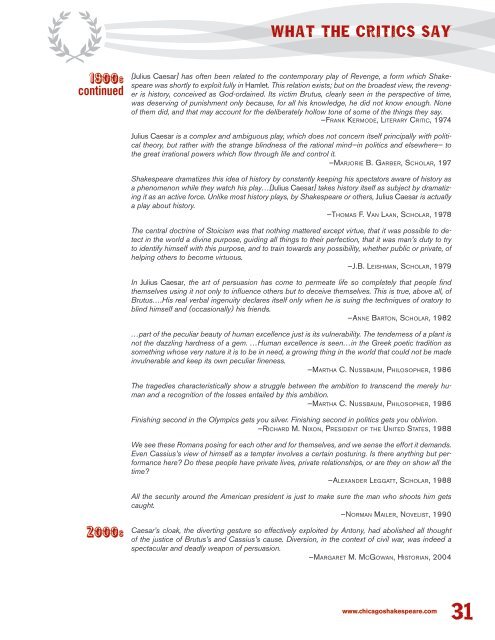Julius Caesar • 2013 - Chicago Shakespeare Theater
Julius Caesar • 2013 - Chicago Shakespeare Theater
Julius Caesar • 2013 - Chicago Shakespeare Theater
Create successful ePaper yourself
Turn your PDF publications into a flip-book with our unique Google optimized e-Paper software.
1900s<br />
continued<br />
2000s<br />
WHAT THE CRITICS SAY<br />
[<strong>Julius</strong> <strong>Caesar</strong>] has often been related to the contemporary play of Revenge, a form which <strong>Shakespeare</strong><br />
was shortly to exploit fully in Hamlet. This relation exists; but on the broadest view, the revenger<br />
is history, conceived as God-ordained. Its victim Brutus, clearly seen in the perspective of time,<br />
was deserving of punishment only because, for all his knowledge, he did not know enough. None<br />
of them did, and that may account for the deliberately hollow tone of some of the things they say.<br />
—Frank kermoDe, liTerary CriTiC, 1974<br />
<strong>Julius</strong> <strong>Caesar</strong> is a complex and ambiguous play, which does not concern itself principally with political<br />
theory, but rather with the strange blindness of the rational mind—in politics and elsewhere— to<br />
the great irrational powers which flow through life and control it.<br />
—marJorie B. GarBer, sCholar, 197<br />
<strong>Shakespeare</strong> dramatizes this idea of history by constantly keeping his spectators aware of history as<br />
a phenomenon while they watch his play…[<strong>Julius</strong> <strong>Caesar</strong>] takes history itself as subject by dramatizing<br />
it as an active force. Unlike most history plays, by <strong>Shakespeare</strong> or others, <strong>Julius</strong> <strong>Caesar</strong> is actually<br />
a play about history.<br />
—Thomas F. van laan, sCholar, 1978<br />
The central doctrine of Stoicism was that nothing mattered except virtue, that it was possible to detect<br />
in the world a divine purpose, guiding all things to their perfection, that it was man’s duty to try<br />
to identify himself with this purpose, and to train towards any possibility, whether public or private, of<br />
helping others to become virtuous.<br />
—J.B. leishman, sCholar, 1979<br />
In <strong>Julius</strong> <strong>Caesar</strong>, the art of persuasion has come to permeate life so completely that people find<br />
themselves using it not only to influence others but to deceive themselves. This is true, above all, of<br />
Brutus….His real verbal ingenuity declares itself only when he is suing the techniques of oratory to<br />
blind himself and (occasionally) his friends.<br />
—anne BarTon, sCholar, 1982<br />
…part of the peculiar beauty of human excellence just is its vulnerability. The tenderness of a plant is<br />
not the dazzling hardness of a gem. …Human excellence is seen…in the Greek poetic tradition as<br />
something whose very nature it is to be in need, a growing thing in the world that could not be made<br />
invulnerable and keep its own peculiar fineness.<br />
—marTha C. nussBaum, philosopher, 1986<br />
The tragedies characteristically show a struggle between the ambition to transcend the merely human<br />
and a recognition of the losses entailed by this ambition.<br />
—marTha C. nussBaum, philosopher, 1986<br />
Finishing second in the Olympics gets you silver. Finishing second in politics gets you oblivion.<br />
—riCharD m. nixon, presiDenT oF The uniTeD sTaTes, 1988<br />
We see these Romans posing for each other and for themselves, and we sense the effort it demands.<br />
Even Cassius’s view of himself as a tempter involves a certain posturing. Is there anything but performance<br />
here? Do these people have private lives, private relationships, or are they on show all the<br />
time?<br />
—alexanDer leGGaTT, sCholar, 1988<br />
All the security around the American president is just to make sure the man who shoots him gets<br />
caught.<br />
—norman mailer, novelisT, 1990<br />
<strong>Caesar</strong>’s cloak, the diverting gesture so effectively exploited by Antony, had abolished all thought<br />
of the justice of Brutus’s and Cassius’s cause. Diversion, in the context of civil war, was indeed a<br />
spectacular and deadly weapon of persuasion.<br />
—marGareT m. mCGoWan, hisTorian, 2004<br />
www chicagoshakespeare com 31




